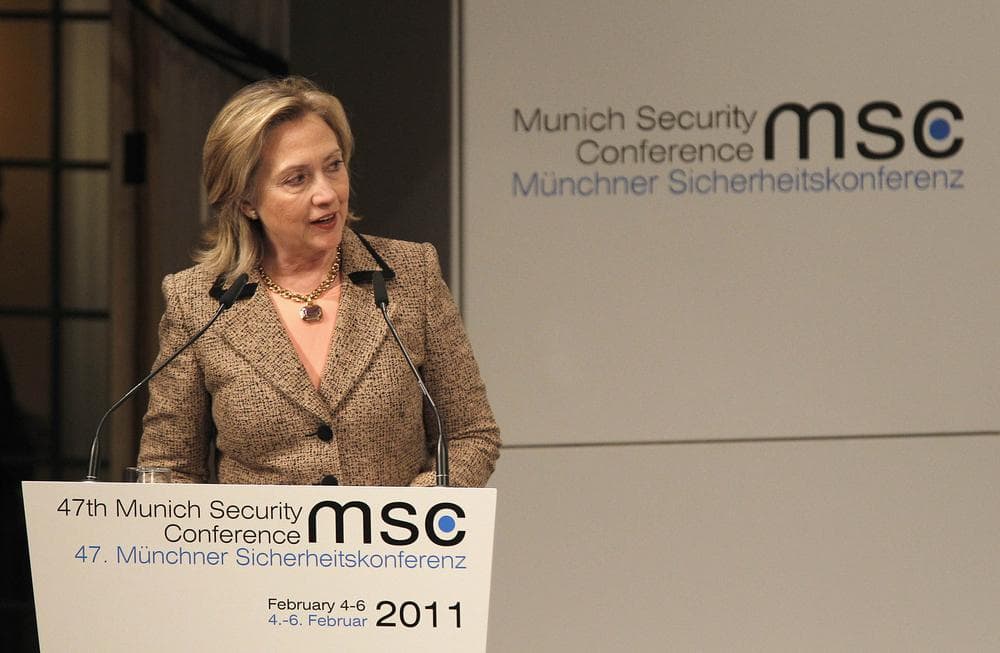Advertisement
Clinton: Mideast Must Reform Despite Risks

U.S. Secretary of State Hillary Rodham Clinton warned Saturday of a brewing "perfect storm" of economic woes, political repression and popular discontent across the Middle East and urged regional leaders to embrace democratic reforms despite risks of short-term instability.
Clinton said uncorroborated reports of an assassination attempt on Egyptian Vice President Omar Suleiman along with an alleged attack on a pipeline were indicative of the kinds of the problems countries could encounter.
Reports of those incidents bring "into sharp relief the challenges that we are facing as we navigate through this period," Clinton told an international security conference in Munich. Aides said Clinton was not confirming reports of an attack on Suleiman, who she said was leading the transition process in Egypt.
Amid anti-government demonstrations in countries like Egypt, Tunisia and Yemen, Clinton said high unemployment along with depleting oil and water reserves and long-simmering unhappiness at autocratic regimes threatens global stability. That unhappiness expands exponentially with new communications technologies, she noted.
"The region is being battered by a perfect storm of powerful trends," she said. "Leaders in the region may be able to hold back the tide for a little while, but not for long."
She said change is a "strategic necessity" that will make Arab nations stronger and their people more prosperous and less susceptible to extremist ideologies. The region will face greater threats and insecurity without such actions, she said.
"This is not simply a matter of idealism; it is a strategic necessity," she said. "Without genuine progress toward open and accountable political systems, the gap between people and their governments will grow, and instability will only deepen."
Clinton's speech mirrored one she delivered last month in Qatar when she warned regional leaders in person that the foundations of progress and development were "sinking into the sand" and would continue to do so unless they acted to meet the aspirations of their people, particularly their exploding youth populations. A day after that speech, Tunisia's longtime autocratic president was driven into exile amid a popular rebellion that in turned inspired protesters in Egypt to step up demonstrations against their leadership.
On Saturday, she appealed to European nations to join the U.S. in pushing broad political, economic and social reform in Egypt and elsewhere, saying incremental steps that do not give people full freedom and opportunity only breed further discontent.
"This is what has driven demonstrators into the streets of Tunis, Cairo, and cities throughout the area," she said. "The status quo is simply not sustainable."
"Some leaders may believe that their country is an exception - that their people will not demand greater political or economic opportunities, or that they can be placated with half-measures," she said. "In the short term, that may be true; but in the long-term that is untenable."
Many Middle Eastern leaders, including embattled Egyptian President Hosni Mubarak who the U.S. and others are pressing to step down, argue that opening up political space without controls will give power to extremists who will destabilize their countries and the region.
Israeli officials have also questioned calls for sweeping democratic reform in their neighborhood, fearing that peace deals with Egypt and Jordan could be threatened and their security imperiled if friendly Arab governments are ousted by popular uprisings backed by radical Islamists.
Clinton allowed that democratic transitions can be messy and can fail when "hijacked by new autocrats who use violence, deception, and rigged elections to stay in power or to advance an agenda of extremism."
But she said leaders who deny their people basic rights open the door to instability rather than close it.
"If the events of these past few weeks prove anything, it is that the governments who consistently deny their people freedom and opportunity are the ones who will, in the end, open the door to instability."
This program aired on February 5, 2011. The audio for this program is not available.